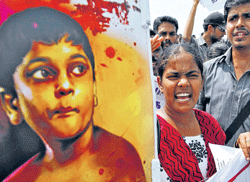
Nobel laureate Amartya Sen’s celebration of the ‘Argumentative Indian’ as enriching India’s ‘unity in diversity’, went for a tumble in Tamil Nadu as its political leaders joust with one another to touch new ‘peaks of loquaciousness’ in demanding action against Sri Lanka for alleged war crimes against Tamils.
The high-decibel belligerence by Tamil Nadu’s political class swung up since UK’s ‘Channel 4’ put out pictures of 12-year-old Balachandran, son of slain Liberation Tigers of Tamil Eelam (LTTE) chief, V Prabhakaran, in February, suggesting that in ‘Eelam War-IV’s last days in 2009, the young lad was “brutally killed” by Sri Lankan Army. The expose came ahead of a crucial March review by the United Nations Human Rights Council (UNHRC) in Geneva.
Known for its embellished political posters and billboards, Balachandran’s innocent face turned into an instant mascot in Tamil Nadu of the “oppression and injustice” the Sri Lankan Tamils have been facing under the “majoritarian Sinhala-Buddhist unitary polity” in Colombo since 1950s.
It is in this backdrop that the 30-year-old ethnic crisis in Sri Lanka bounced back now as the biggest politico-diplomatic challenge for the Congress-led UPA Government in New Delhi. Big Tamil refugee influx initially gave Tamil Nadu politicians a handle to emotively meddle, to influence the Central Government’s decision-making, affirming an ‘umbilical chord ties’ that did not always help the Island Tamils. It often messed up Delhi-Chennai-Colombo equations.
Almost all parties had hobnobbed with the separatist LTTE and other Tamil groups, even sympathising with the Tigers’ goal of carving out ‘Tamil Eelam’ (separate Tamil state) in Lanka’s Tamils-majority North-East areas as “the only solution” to the ethnic crisis. But post-May 1991, these groups lost all domestic sympathy after former Prime Minister Rajiv Gandhi’s assassination by a LTTE squad in Tamil Nadu.
While India’s subsequent ‘hands off’ Sri Lanka policy virtually decoupled Tamil Nadu parties from the issue, for the DMK, a key Congress ally, political sums now changed. Shrewdly, its patriarch M Karunanidhi revived the ‘TESO’ (Tamil Eelam Supporters Organisation) in 2012, to neutralise the political fallout of DMK’s “failure” to get New Delhi “enforce a ceasefire” at the peak of Lanka’s 2008-09 military offensive there.
Karuna’s lament
“When did we not protest?” Karunanidhi blasts his critics. “Rajapaksa (Sri Lankan President) took us for a big ride,” the nonagenarian DMK chief laments these days. Hence, DMK, egged on by a Net-savvy Sri Lankan Tamil diaspora abroad, tried hard to push for India drafting stinging amendments to the US-sponsored resolution in the run-up to UNHRC meeting, including a declaration that the Sri Lankan Army “committed genocide” in the war’s last lap and the need for a ‘credible, international probe into its war crimes’.
However, as India played cool at Geneva, Karunanidhi pulled out his ministers from the UPA and DMK also snapped its nine-year-long ties with the Congress. Even after the UNHRC debacle, “India can still put pressure on Sri Lanka to fulfill the promises it has already made, the four Ds’ of demilitarization of Tamil areas, devolution of powers to Tamils, democratisation and development,” DMK spokesman T K S Elangovan told Deccan Herald.
“But there is no question of DMK going back to the Congress-fold,” he asserted, refuting impressions that DMK’s decision was “too late”, smarting under the pain of ‘2G-scam’ blows.
“The US resolution is not going to deliver justice for the Sri Lankan Tamils; it is yet another betrayal by the Indian Government,” fumed MDMK leader Vaiko, who along with Tamil Nationalists Movement leader P Nedumaran and Dalit leader Thirumavalavan, has consistently supported the LTTE.
Public protests too startlingly swelled of late, as thousands of students boycotted classes to make ‘Tamil Eelam’ and ‘catch-and-try-Rajapaksa’ as the foci of a new Tamil jingoism. “We are here on the streets spontaneously to condemn the genocide against the Tamils,” said an IIT-Madras student.
Yet, New Delhi was not impressed to even hint a change in its policy course on Sri Lanka. Tamil Nadu Chief Minister and AIADMK leader J Jayalalitha had already cancelled Chennai hosting the Asian Athletic Championships slated for July amid attacks on visiting Sri Lankans by angry pro-Tamil goons.
‘Amma’ fired another salvo against IPL fixtures in Chennai including Lankan cricketers. She also outdid the DMK’s chorus against India participating in the Commonwealth Heads of Government meeting in Colombo in November. Finally, Jayalalitha, knowing that the Tamils’ issue made little electoral impact, topped it all with an unprecedented resolution in the Assembly on March 27, calling for, among other things, India moving the UN Security Council for a referendum to enable a ‘Tamil Eelam State’.
“I cannot agree with any aspect of the Assembly resolution,” declared Cho S Ramaswamy, veteran political Editor and Jayalalitha’s long-time well-wisher, also disapproving her IPL stance. “The Tamil Nadu Assembly demanding creation of ‘Tamil Eelam’ will only embolden newer fringe pro-LTTE groups here and overturn her resolve to fight terrorism,” feared another veteran political observer.
‘Plebiscite suicidal’
“The Congress-bashing by both DMK and AIADMK shows how Lankan Tamils-centric their competitive politics is again playing out in Tamil Nadu; they must first know what the Tamils in Sri Lanka really want,” says K S Alagiri, senior Congress MP from Cuddalore, defending the Centre’s approach to nudge a ‘stable political solution’ on the basis of the Rajiv-Jayewardene July 1987 Accord.
“Support the Tamils in Lanka to sustain their lives through development; a plebiscite (for Tamil Eelam) will be simply suicidal; it will only create another May 2009 (killings) as the Sri Lankan Tamils population now is just over 20 lakh (excluding Indian-origin Tamils),” cried Satchidanandam, an elderly Lankan Tamil, in Chennai. Will Delhi hear out such sane voices even while supporting UNHRC’s positive momentum towards Lankan accountability?
Related articles
Challenges to India’s policy
‘We need time and space to carry on rehabilitation’